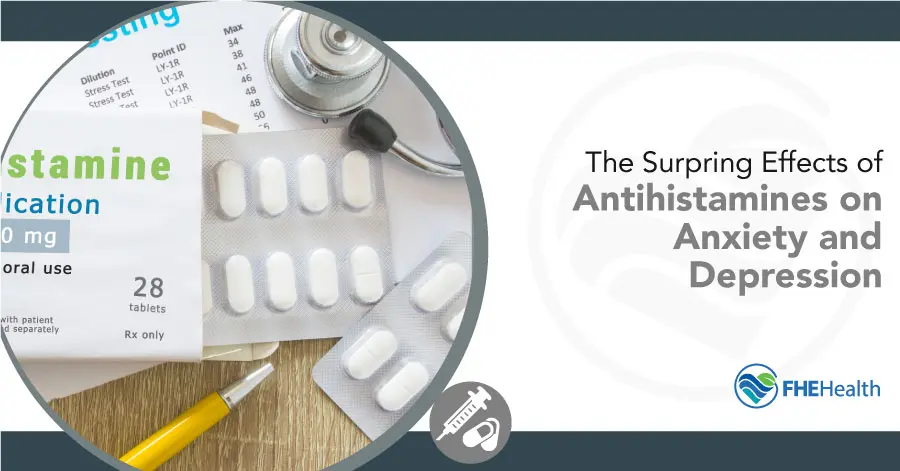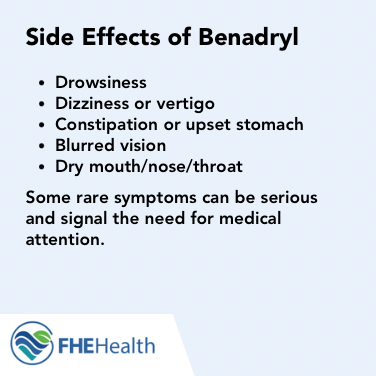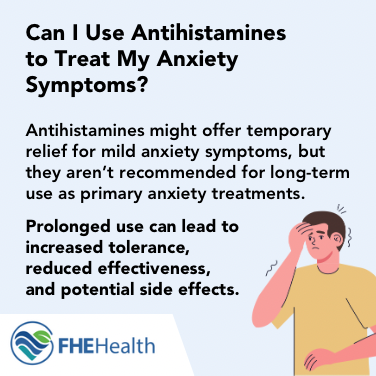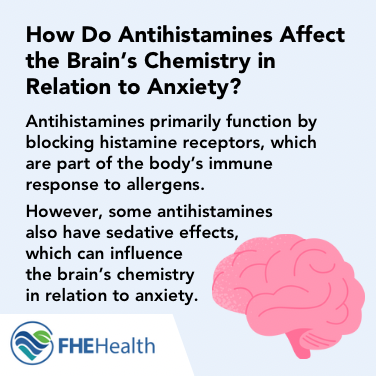
Updated November 8, 2024
Doctors sometimes prescribe a drug for use outside of its listed purposes, especially if it looks safe and they believe it will be effective. This off-label use is common with many classes of drugs. That includes antihistamines, which have emerged as a promising way to treat short-term anxiety.
Can You Take an Antihistamine for Anxiety?
Anxiety disorders are the most common psychological condition in the United States. This large class of conditions includes many specific disorders and affects an estimated 32% of American adults at least once in their lives. Often, this is a short-term issue. Many people experience bouts of anxiety, disturbed sleep or restlessness for 12 months or less. In these cases, certain antihistamine drugs have shown promising results for the off-label treatment of anxiety disorders.
Although the literature shows a link between antihistamines and anxiety treatment, the FDA hasn’t approved every antihistamine for treating anxiety. Only a doctor can give medical advice, and you should always consult with one before adjusting a course of medication. This is true even for over-the-counter drugs like Benadryl. Antihistamines aren’t an approved treatment for anxiety that lasts more than 12 months. They’re also not for use with serious psychotic or other disorders that require specialized care from a psychiatrist.
What Are Antihistamines?
Antihistamines are a class of drugs used to treat allergies and the symptoms of cold and flu. Usually available over the counter, these drugs work by suppressing some elements of the body’s natural immune system. The irritating symptoms associated with allergies are usually caused by a type of protein in the bloodstream called histamine. By blocking this chemical’s action, antihistamines can limit the negative effects of allergies and respiratory viruses.
What Is Benadryl?
 Benadryl is a leading brand of over-the-counter antihistamines that is sometimes used for anxiety. Its active ingredient is diphenhydramine, which can dry out the sinuses and prevent watery eyes. Off-label, Benadryl and its generic competitors can be used to treat motion sickness. Because diphenhydramine acts as a sedative, it can also be helpful for very short-term treatment of insomnia, ideally for a single night.
Benadryl is a leading brand of over-the-counter antihistamines that is sometimes used for anxiety. Its active ingredient is diphenhydramine, which can dry out the sinuses and prevent watery eyes. Off-label, Benadryl and its generic competitors can be used to treat motion sickness. Because diphenhydramine acts as a sedative, it can also be helpful for very short-term treatment of insomnia, ideally for a single night.
Benadryl has a short list of side effects. These are usually minor and go away on their own. Some rare symptoms can be serious and signal the need for medical attention. Relatively mild side effects include:
- Drowsiness
- Dizziness or vertigo
- Constipation or upset stomach
- Blurred vision
- Dry mouth/nose/throat
Many people who use Benadryl experience no noticeable side effects at all. Some effects are potentially serious, however. Call your doctor for advice immediately if you experience mood or mental changes, difficulty passing urine, or a fast/irregular heartbeat.
What Is Hydroxyzine?
Like Benadryl, hydroxyzine is an antihistamine. It has sedative properties and is frequently used off-label for many conditions. These include insomnia, nausea, vomiting, itching, and skin rashes. Unlike Benadryl, hydroxyzine has been approved by the FDA for the treatment of anxiety.
Hydroxyzine serves as a potential solution for managing anxiety and tension stemming from emotional and nervous situations. Additionally, it has been found beneficial in inducing sleep prior to surgical procedures. It’s essential to note that this medication is also effective in alleviating symptoms associated with allergic conditions, such as chronic urticaria and both atopic and contact dermatoses. Remember, you should always consult with a healthcare professional before making any medication decisions.
Hydroxyzine is available by prescription under the brand name Vistaril. It comes as a liquid oral suspension and may be taken daily for up to four months to treat anxiety. If your anxiety symptoms last longer than this, speak with your doctor about whether to continue taking the medicine. Don’t change the dose or discontinue Vistaril without first consulting with your doctor or pharmacist.
Some drugs have negative interactions with hydroxyzine. You may not be able to take it if you’re also taking drugs that cause drowsiness. This includes sleeping pills, narcotic pain relievers, muscle relaxants, or a benzodiazepine such as Xanax. It’s potentially dangerous to take hydroxyzine at the same time as certain other drugs. These include antidepressants, heart medicine, antipsychotics, and various drug cocktails used to treat HIV, malaria, and cancer.
Are Antihistamines Safe to Use as Anxiolytics?
Antihistamines are primarily recognized for their effectiveness in counteracting allergy symptoms by blocking the effects of histamine in the body. Over time, due to their sedative properties, some antihistamines have been explored for their potential in alleviating anxiety symptoms.
While there’s promise in using antihistamines for short-term anxiety relief, it’s imperative to tread with caution. Not every antihistamine is approved by health authorities for treating anxiety, and any off-label use should always be under the vigilant guidance of a healthcare professional. We understand the profound challenges that come with anxiety and the natural inclination to seek out relief. However, safety and efficacy must remain at the forefront of any treatment consideration. Comprehensive clinical studies provide valuable insights into the potential and limitations of antihistamines as anxiolytics.
Before venturing into using this antihistamine for anxiety treatment, it’s paramount to consult with a healthcare provider to weigh the potential benefits against the risks and to determine appropriate dosages.
How Do Antihistamines Compare to Traditional Anxiety Medications?
 Antihistamines, primarily designed to counteract allergy symptoms by blocking histamine, have garnered attention for their sedative effects and potential off-label use in treating mild anxiety. On the other hand, traditional anxiety medications, such as benzodiazepines, are crafted to directly influence neurotransmitters in the brain that modulate mood and stress, making them more tailored for anxiety treatment.
Antihistamines, primarily designed to counteract allergy symptoms by blocking histamine, have garnered attention for their sedative effects and potential off-label use in treating mild anxiety. On the other hand, traditional anxiety medications, such as benzodiazepines, are crafted to directly influence neurotransmitters in the brain that modulate mood and stress, making them more tailored for anxiety treatment.
Effectiveness
In terms of effectiveness, while some individuals might find temporary relief from mild anxiety symptoms with antihistamines, traditional anxiety medications are generally more potent and consistent in their results, given their specific design for this purpose.
Side Effects
Side effects may vary: antihistamines might lead to drowsiness or dry mouth, whereas traditional anxiety medications can come with a risk of dependence and more pronounced withdrawal symptoms.
Accessibility
Accessibility is another distinguishing factor. The ease of obtaining antihistamines, often available over the counter, contrasts with the prescription requirement and regular monitoring associated with traditional anxiety medications.
However, it’s crucial to emphasize that the accessibility of antihistamines doesn’t equate to them being a suitable replacement for traditional anxiety treatments. Their use for anxiety should be approached with caution, and a comprehensive evaluation by a healthcare provider is indispensable. In essence, while both antihistamines and traditional anxiety medications have their places in healthcare, their roles, effectiveness, and risks differ, making it vital to consult with a healthcare professional for an informed treatment decision.
Are There Any Side Effects of Using Antihistamines for Anxiety?

Yes, using antihistamines for anxiety can lead to side effects. Commonly, individuals might experience drowsiness, dry mouth, dizziness, blurred vision, or digestive issues. While the sedative properties can temporarily alleviate anxiety, they may not be suitable for everyone, especially those needing to stay alert. Less common but concerning effects include mood changes, urinary difficulties, and irregular heartbeats. It’s also vital to be cautious of potential interactions with other medications or supplements. Given these considerations, it’s essential to consult a healthcare provider before using antihistamines for anxiety to ensure safety and appropriateness.
What Should You Consider Before Using an Antihistamine for Treating Anxiety Disorders?
Taking any medication is always a balancing act between the positive and negative effects of the drug. Taking antihistamines to treat anxiety and depression can be effective, but there are some drawbacks to consider. The major advantages of using commonly available antihistamines are their generally lower cost and readier availability than prescription anxiety drugs. Antihistamines are also generally less likely to cause dependence and addiction than other sedatives.
Antihistamines can be helpful over short time frames when used in conjunction with the nonmedical therapy you’re getting. It’s relatively easy to get some antihistamines, especially Benadryl. This encourages many people who prefer to avoid prescription drugs to use over-the-counter antihistamines instead. It may be preferable to neglect getting any treatment at all for anxiety and depression.
Taking antihistamines for off-label purposes isn’t without drawbacks, though. Most antihistamines are known to cause drowsiness during the day. This may be a problem for people who operate heavy machinery or otherwise must remain alert. These drugs also aren’t effective for severe anxiety or depression, and they’re not a long-term treatment for any anxiety disorder.
Because of their ready availability, antihistamines could also potentially increase the risk of a negative interaction. This includes other prescriptions and over-the-counter drugs. Negative interactions can even happen with vitamins or nutritional supplements.
How Long Can I Use Antihistamines to Treat My Anxiety Symptoms?
Antihistamines, while primarily designed for allergy relief, have been considered for short-term anxiety treatment due to their sedative effects. However, their use for anxiety should be approached with caution. Typically, antihistamines might offer temporary relief for mild anxiety symptoms, but they aren’t recommended for long-term use as primary anxiety treatments. Prolonged use can lead to increased tolerance, reduced effectiveness, and potential side effects. They also aren’t suitable for addressing the root causes of anxiety disorders. It’s crucial to consult with a healthcare provider to determine the appropriate duration and to explore more targeted, long-term treatment options for anxiety. Always prioritize a comprehensive approach to mental health care.
Are There Any Studies That Support the Use of Antihistamines for Anxiety?

There have been studies exploring the potential use of antihistamines for anxiety due to their sedative properties. Some antihistamines, like hydroxyzine, have been specifically studied and even approved in certain regions for the treatment of generalized anxiety disorder. These studies often highlight the short-term benefits of antihistamines in alleviating mild anxiety symptoms.
However, it’s essential to note that while some findings are promising, antihistamines are not universally recognized as primary treatments for anxiety disorders. The majority of the research focuses on their short-term use and potential as an adjunctive or temporary solution.
For a comprehensive understanding and to make informed decisions, it’s advisable to consult with healthcare professionals who can provide insights into the latest research and its implications for individual treatment.
How Do Antihistamines Affect the Brain’s Chemistry in Relation to Anxiety?
 Antihistamines primarily function by blocking histamine receptors, which are part of the body’s immune response to allergens. However, some antihistamines also have sedative effects, which can influence the brain’s chemistry in relation to anxiety.
Antihistamines primarily function by blocking histamine receptors, which are part of the body’s immune response to allergens. However, some antihistamines also have sedative effects, which can influence the brain’s chemistry in relation to anxiety.
The sedative properties of certain antihistamines are often attributed to their ability to cross the blood-brain barrier and interact with receptors in the central nervous system. By doing so, they may reduce the activity of certain neurotransmitters that are associated with alertness and arousal.
In the context of anxiety, this calming effect can temporarily alleviate symptoms by promoting relaxation and reducing overstimulation. It’s a secondary effect rather than a targeted treatment for anxiety, and it doesn’t address the underlying causes of anxiety disorders.
Limits & Considerations
It’s important to recognize that while antihistamines might offer short-term relief for mild anxiety symptoms, they are not a substitute for specialized anxiety treatments that are designed to directly influence the brain’s neurotransmitter balance in a more targeted and effective manner. Consulting with a healthcare provider is essential to understand the most appropriate treatment approach for individual anxiety conditions.

When Should You See a Doctor if You Think You’re Struggling with Anxiety or Depression?
You shouldn’t delay seeing a doctor when you have doubts about your medical condition or when you’re about to start a new medication. Talk to your doctor or psychiatrist at the first sign of anxiety or depression, as these are serious conditions that may need professional care. Always ask your doctor about potential drug interactions if you’re currently taking medication or herbal supplements for any reason. Seek help immediately if you take an antihistamine and experience a negative reaction, especially if it impairs your ability to breathe.
Anxiety and depression are both very serious emotional health issues that frequently need specialist care to treat. If you think you may be dealing with an anxiety disorder, call us at (833) 591-1536 right away. Our compassionate team of counselors knows what you’re going through and can help. Start your journey to lifelong recovery with us now.
FAQs About Antihistamines for Anxiety Treatment
Q: Is it safe to take Benadryl when I’m feeling anxious?
A: It is common, but you need to be careful. Doctors call this “off-label” use. Benadryl (diphenhydramine) works as a sedative, so while it might help you sleep through a bout of restlessness, it isn’t FDA-approved to treat anxiety disorders. It’s generally fine for a single night of insomnia, but it dries out your sinuses and isn’t a long-term solution.
Q: Is there an antihistamine that is actually approved for anxiety?
A: Yes. Hydroxyzine, often sold under the brand name Vistaril, is a prescription-only antihistamine that is FDA-approved for anxiety. Doctors typically prescribe it for short periods, usually up to four months, to manage tension. Unlike Benadryl, it is specifically dosed for this purpose and sometimes comes as a liquid oral suspension.
Q: Will this cure my anxiety?
A: No. Antihistamines only mask the symptoms by making you too tired to feel them.
Q: Are these addictive like Xanax?
A: This is a major difference between the two drug classes. Benzodiazepines (like Xanax) carry a high risk of chemical dependence and severe withdrawal. Antihistamines generally do not cause chemical addiction. However, your body can build a tolerance to them very quickly; if you use them daily, they will likely stop working, or you might feel the need to take higher doses to get the same effect.
Q: Can I drive or go to work after taking them?
A: You should not. “Brain fog” is real. Because these drugs work by suppressing your central nervous system, they cause dizziness, blurred vision, and slower reaction times.
Q: I take other medications. Is it safe to add an antihistamine to the mix?
A: That depends heavily on what you are taking. Antihistamines can have dangerous interactions with antidepressants, antipsychotics, and heart medications. Mixing them can amplify the sedative effects to a dangerous level or cause irregular heartbeats. You need to clear this with your doctor first.
Q: What are the side effects I should watch out for?
A: Beyond the obvious drowsiness, you might experience dry mouth, dizziness, or an upset stomach. In rare cases, they can cause difficulty passing urine or mood changes. If you notice your heart beating irregularly or feel a shift in your mental state, stop taking them and call your doctor immediately.






